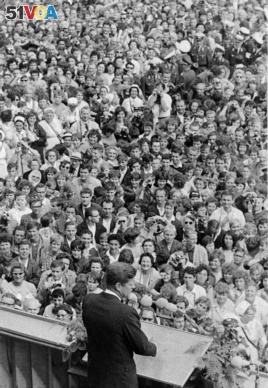November 20,2013
BERLIN — Friday, November 22, marks 50 years since the assassination of President John F. Kennedy in Dallas. At the time, the Cold War between the United States and the Soviet Union was at its height, and there was no greater flashpoint than the divided city of Berlin. Kennedy spoke there just months before his assassination.

"There are some who say that communism is the wave of the future. Let them come to Berlin!”
Kennedy came to Berlin in June 1963. The divided city had become the frontline in the Cold War, noted analyst Andreas Etges from the University of Munich.
“Berlin had highly symbolic value for both sides. For the Americans especially, I think you could describe Berlin as a kind of frontier city where American values and American freedom should be defended against the communist powers,” said Etges.
In August 1961, Soviet Premier Nikita Khrushchev ordered the building of the Berlin Wall to prevent East Germans from fleeing. Fear and chaos gripped the city, says West Berliner Alexander Longolius.
“The Western allies would protect us, especially the Americans. But that was kind of a na?ve conviction," he said.
The Germans had criticized Kennedy for accepting the wall. The U.S. wanted to reassure West Berliners that Soviet aggression would stop at the wall.
“People had been lining up all over the city," recalled analyst Etges. "Kids didn’t have to go to school. Many major companies let their workers go.

U.S. President John F. Kennedy, standing on a rostrum, addresses a large crowd in the main square in front of Schoeneberg City Hall in West Berlin, Germany, June 26, 1963.
“So he basically, on the spot, decided he’s not going to give that speech," said Etges. "He had someone help him write down on a notecard a few things in German and then delivered the speech we all know.”
Alexander Longolius recalls: “It was just absolutely crazy. The place itself is not that large, so in order to get those masses of people there, they had to stand in all the side streets. All the balconies where filled. Everybody wanted to be there.“
“I am proud to come to this city," said Kennedy.
“There is I think two components. One is Kennedy is actually talking about that some people do suggest détente policy and working with the Soviet Union,” said Etges. “The other message was to renew once again America’s commitment to Berlin. And he did this with the most famous words of that speech.
For West Berlin resident Alexander Longolius, “There were some doubts whether he would be able to stand up to Khrushchev, or Khrushchev would take him as a young inexperienced president. All that was gone.
In East Berlin, reaction was more critical, according to East Berlin resident Werner Kraetschew.
“The reaction was that we do not belong to this world and will never belong to this world, because the Americans will help West Berliners, but not us,” he said.
The wall would stand for another 26 years, but at that moment Kennedy stood firm against the Soviets.
He later told an aide, “We will never have a day like this one as long as we live.”